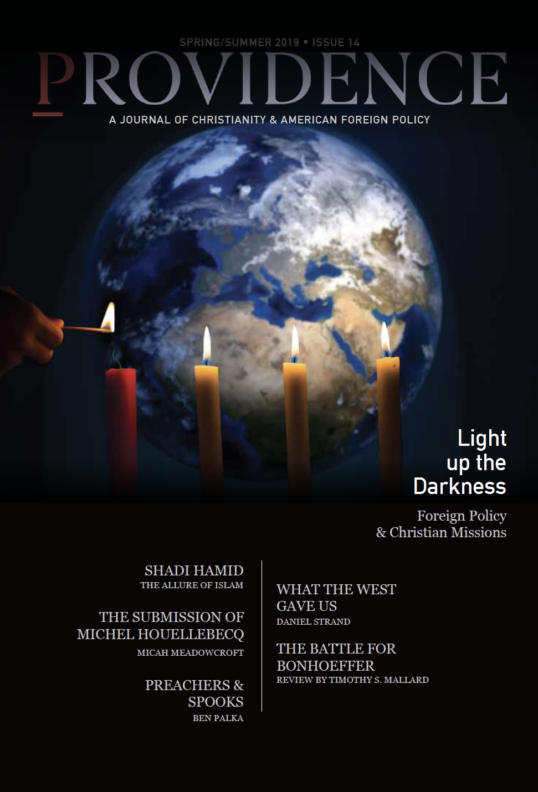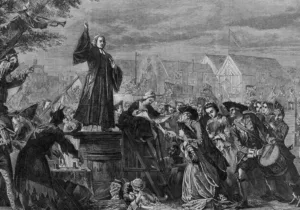In recent years, critical American scholarship on the life and witness of Pastor Dietrich Bonhoeffer has uncritically polarized the anti-Nazi German pastor along two generalizations: he is either seen as a type of contemporary, Western Christian evangelical standing against state hegemony and tyranny (à la Eric Metaxas) or as a type of proto-liberal, progressive herald standing for unchecked secularist freedom (à la Charles Marsh, who also wrongly opined that Bonhoeffer was gay). Both poles have been operative in American scholarship about Dietrich Bonhoeffer since the initial post-World War II publications of his nascent works, especially Discipleship and Life Together. Professor Stephen Haynes is aware of and concerned by this polarization of the Confessing Church leader, and has for many years sounded the tocsin to warn American scholarship (and popular readership) of the dangerous trap which these two types of generalizations about Bonhoeffer offer us moderns. Indeed, as a member of the International Bonhoeffer Society, your author has appreciatively benefitted in the past from Haynes’ sober and reflective concern. Moreover, his call for balance in reading and employing Bonhoeffer has been a welcome correction to the contemporary tide of American eisegesis, and Haynes has often stood in fidelity to the international (particularly German) academic neutrality in letting Bonhoeffer speak from amidst his historical context.
Given Haynes’ past stance, then, this is what so severely disappoints about his present work, The Battle for Bonhoeffer: Debating Discipleship in the Age of Trump. As the title indicates (and as the book bears out), Haynes falls into the very trap for which he previously so rightly criticized others. Put baldly, he has read into Bonhoeffer a new type of caricature, one that calls us to stand against the perceived and feared cult of personality that American liberals fear in the presidency of Donald Trump. While Haynes reviews both the evangelical and liberal typologies above, this work seems to evidence that Haynes just cannot help himself from identifying with the latter camp. In the end, one finishes his work with a wish that Haynes had been honest with the reader from the outset about his political bias, and said candidly that as an American proto-liberal he would take the reader on a journey to prove his perspective. While he conclusively fails to persuade the reader of his argument, Haynes could have admitted the lens through which he perceives Bonhoeffer; astute but disappointed readers will come to this conclusion anyway by the end of this work.
Haynes shapes his argument along two consistent trajectories. First, he admirably lays bare the trends in both scholarship and popular culture of misappropriating Bonhoeffer in support of contemporary political agendas. Haynes is at his finest when he reveals the shoddy study or scholarship behind many such efforts, particularly the reflexive, internet-deep citation of Bonhoeffer’s actual or supposed words. So many American moderns—both conservative and liberal alike—routinely misquote Bonhoeffer that the contemporary scene is now littered with words which the famed pastor never uttered or wrote. As a lifelong and dedicated Bonhoeffer scholar, Haynes has the chops to recognize such fraud and does not generally fail to do so, but more on that shortly.
However, he limits his capacity to fulfill this task in the second trajectory he takes. Indeed, while categorically laying bare the contemporary American liberal paranoia over the presidency of Donald Trump (throughout chapters 4 through 6 but particularly in chapters 8 and 9, which detail the presidential election of 2016), Haynes evidences a perpetual unwillingness to do two things. First, he is unwilling to listen equitably to the religious freedom concerns many Americans had over the candidacy of Hillary Clinton, who as an Obama administration cabinet secretary and Democratic Party nominee was on record as stating that the First Amendment needed excision from the Constitution, putatively over campaign finance concerns centering around the US Supreme Court decision of Citizens United. Second, he is unwilling to more rigorously call out liberal theo-political misappropriation of Bonhoeffer as much as he does that of conservative evangelicals. Indeed, in the latter stages of the book Haynes parrots the liberal hysteria over Trump being a type of despotic if not unstable ruler whose very existence imperils not only the republic but also humanity itself (see the “nuclear war” shibboleth, pp. 123–ff.). Here, Haynes (and presumably his liberal theo-political allies) could use a remedial course in American civics and governance. Not once does Haynes mention (or cite others who mention) elements of the checks and balances of American constitutional democracy, such as the president’s cabinet, interagency departmental secretaries who comprise that cabinet, the bedrock controlling principle of the civil-military divide, the House of Representatives, the Senate, the Supreme Court, circuit or appellate courts, state governors or legislatures, etc. In essence, Haynes quickly falls into morally correlating the presidency of Donald Trump with the almost unchecked power of Adolf Hitler when the two people and their political ideologies could not be more dissimilar in either form or function. Indeed, if the Trump presidency evidences anything it is the sheer genius of the political wisdom of the Founding Fathers who arranged the American body politic so that no single man or woman would ever wield unchecked power, which Haynes seems to believe Donald Trump now enjoys.
In sum, notwithstanding Stephen Haynes’ professional reputation amongst Dietrich Bonhoeffer scholars or his prior excellent corpus of scholarly writings about the German pastor, his current book categorically fails to satisfy. If one wishes to read a balanced rendering of the life of Dietrich Bonhoeffer, one perhaps will do best to return to a standard such as Ferdinand Schlingensiepen’s outstanding 2010 effort (avoid at all costs the hagiographic, typological work of Metaxas or the poor historical and translation efforts of Marsh). Moreover, if one wishes to read a balanced theo-political analysis of Bonhoeffer and the Confessing Church in context, one may enjoy the penetrating individual works of either Victoria Barnett or Wolfgang Gerlach. The best primary source for Bonhoeffer’s most rigorously sourced writings, sermons, etc. remains the 17-volume International Dietrich Bonhoeffer Society (English Language Section) translation of his works published via Fortress Press. In contrast, Stephen Haynes’ most recent work continues the oft-valid international criticism of the American academy’s misappropriation of Dietrich Bonhoeffer, to wit: whether conservative or liberal, we Americans are only interested in Bonhoeffer for what he can do for our contemporary theological, political, or social aims. Put another way, we wish to use Dietrich Bonhoeffer as a means to our own ends rather than as an end himself. The Martyr of Flossenbürg deserves better than that; wise students will read and study him for himself in his context and be all the richer for it.
Chaplain (Colonel) Timothy S. Mallard, PhD, is a career US Army chaplain of the Evangelical Presbyterian Church and has deployed to combat operations as a Battalion, Brigade, and Division Chaplain. He currently serves as the Command Chaplain, United States Army Europe and Seventh Army in Wiesbaden, Germany.








 Live in the DC area? Sign-up for Providence's in-person events list!
Live in the DC area? Sign-up for Providence's in-person events list!